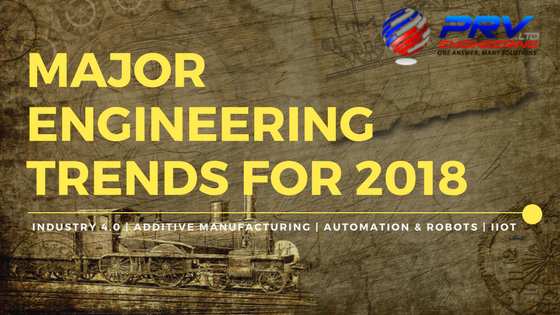
Reflecting back on 2017 we saw a number of engineering trends making their mark in a big way. Some include advanced robotics, additive manufacturing, IIoT, quantum computing and big data. Even though it’s possible to identify hundreds of minor developments, what are the major engineering trends to follow in 2018? Take a look at these top trends we put together to end the year on a positive note.
Engineering Trends In Industry 4.0
Industry 4.0 or ‘Smart Manufacturing’ is the current industrial transformation with automation, data exchanges, cloud, cyber-physical systems, robots, IoT and semi-autonomous industrial techniques. It certainly is on the rise and industries needs to be ready. We’ll take a look at two main developments.
-
Additive Manufacturing
Additive manufacturing, or 3D printing, is becoming more important and adopted more in commercial engineering environments. Common applications of additive manufacturing include the production of components for use in the aerospace, defence, medical, automotive and power generation industries. Some of the world’s largest manufacturing companies are investing heavily in rapid technologies so demand is set to increase throughout 2018. The increase in demand is predominantly for skilled engineers using additive manufacturing technologies, or those who are adept at integrating it into production environments.
-
Automation and Robotics
The last decade has seen some incredible advances in automation and robotics which is still on the rise. Current widespread adoption and recent developments continue to impact productivity and impact how engineering can do business across the entire product lifecycle.
This trend has shown tremendous improvements in productivity and the talent gap within manufacturing. As a result, 2018 will offer significant competition for talented professionals such as instrumentation and controls technicians, automation engineers and industrial control systems designers. On the opposite spectrum, there will undoubtedly be a negative effect on lower-skilled workers. Perhaps upskilling of workers is something companies need to really focus on in 2018.
Industrial Internet of Things (IIoT)
The Industrial Internet of Things (IIoT), also known as the Industrial Internet, brings together advanced machinery, analytics and people in the workplace. It will continue to have an effect on engineering as more solutions and services become readily available.
An example is the “smart factory” concept enabled by the Industrial Internet of Things (IIoT). It features data connectivity between production machines, CAD/CAM, ERP and suppliers. The vision is that within smart factories, cyber-physical systems monitor physical processes, create a virtual copy of the physical world and make decentralised decisions.
Manufacturing and process engineers are increasingly expected to be fluent and adept at data access and analysis within these environments. In fact, 17% of engineering jobs require AutoCAD® skills which is a clear indication of what engineers need to focus on in 2018.
Industrial Sustainability
Our understanding of the Earth’s environment and the negative impact of industrial activity raises concerns on how the industry should be designed and built. Since the 17th century, the volume of internationally traded goods increased 800 times. The last decade alone saw the world’s industrial production increased more than 100 times. The rate of global fossil fuel consumption has also increased considerably since 1900.
As a result, industrial sustainability has been a hot topic of discussion for quite some time. Expect projects involving energy and resource conservation, emissions control, renewable energy systems, or waste reduction to dominate the industry next year. Among others, electrical-, environmental- and energy engineers will once again be in high demand. In fact, the demand for environmental engineers is set to grow 9% by 2021, and 8% for environmental engineering technicians.
Reducing our carbon footprint with products and packaging (lightweighting) is another area where sustainability engineering should continue to expand.
Industrial Optimisation
Engineering trends continue with a focus on optimising processes in key areas including production, supply chain, product design and predictability. Lean Six Sigma® and the importance of product and process quality will continue to drive a need for quality engineers, analysts, and other engineering professionals. This means engineering professionals with experience in quality assurance, lean manufacturing and production optimisation should be feeling positive in 2018.
A recent analysis of engineering job postings showed that 17% need quality assurance skills, 11% Six Sigma experience and 7% Lean manufacturing. That’s a grand total of 35% of all engineering posts. Keeping abreast of technologies, trends and skill requirements should be a big focus in 2018.
What are your thoughts on current and future engineering trends? Do you have more to add to this list? Feel free to share your comments in the section below. Please get in touch if you need assistance with your engineering project. We specialise in a number of industries including automotive, rail, construction, aerospace and defence.
We would also like to take this opportunity to wish you and your family a very Happy New Year. Let’s make 2018 a prosperous, exciting and sustainable one!
This site uses Akismet to reduce spam. Learn how your comment data is processed.


 Mail:
Mail: 





Leave a Comments